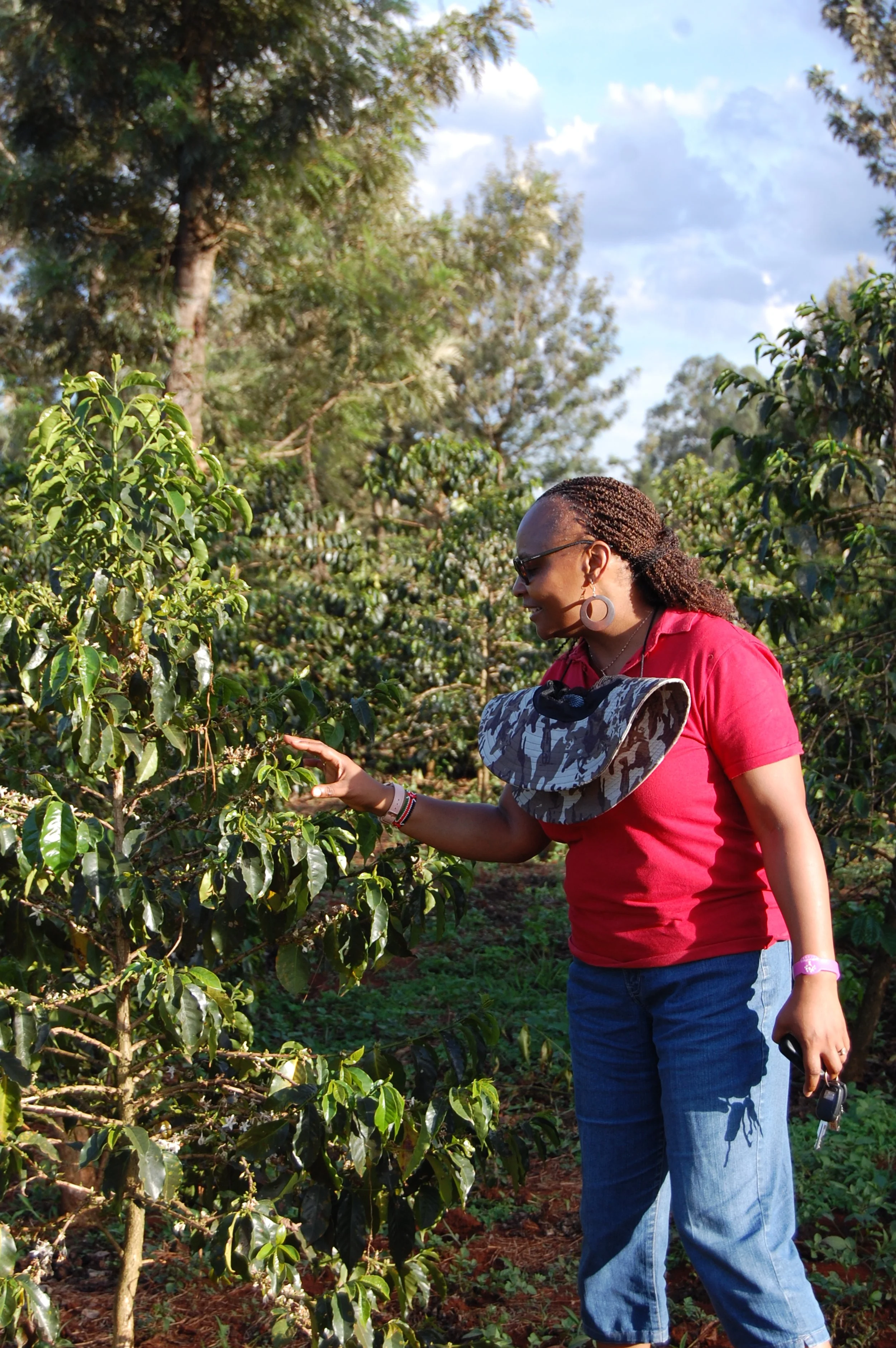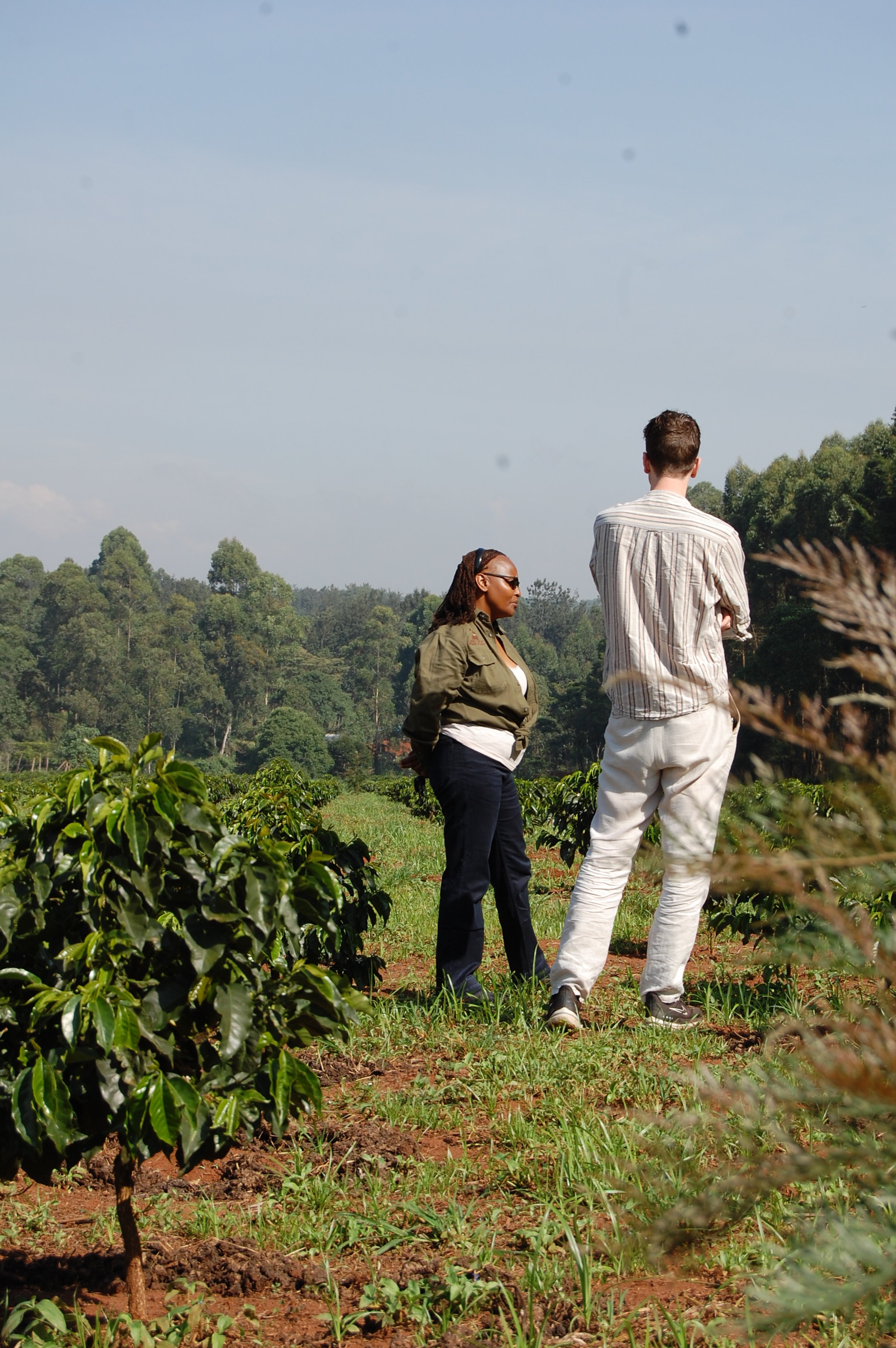A banker going beyond just transactions
In 2017 when Jane quit her job, she wanted to take a chance on herself and become a farmer. Her husband’s family farm at that time was growing maize and rearing cattle with a few coffee trees. 2015 was the first time, the Wanrich farms flirted with possibility of growing speciality coffee in that soil. Although in those two years even when they provided canopy, weeded, pruned the coffees, the trees refused to be productive. As soon as Jane moved back to Kitale, she also attended an agricultural show where she met someone from the coffee research institutue. That was one of the first turning points in her story because she got a lot of support regarding how the trees have to be managed throughout the year. Jane then took it upon herself to continue on her quest and this time she also wanted to become well versed as an exporter. Together with Gloria’s help, she started attending workshops on coffee exporting to get a better grip regarding the needs of the coffee world.
During this time, the coffees planted in 2015 were close to fruition and they harvest 2 bags from 8 acres of land dedicated to coffee. Jane knew then that both her and her coffee were hardly close to their potential. She started getting help from the coffee research institute regarding the best varieties to be planted for their soil condition, following calendars that offered guidelines about maintenance and learning more about the market.
2 bags became 9 then it became 50 and in 2021 close to 100 (that included lower grades) and the list keeps growing!
Coffee was instrumental to Jane’s growth and satisfaction as a farmer. It helped her build several connections in her community. Most important of them all was the one she has been building with her employees over the last few years. She has been able to identify which of them have continued to remain with her and started supporting them by offering year around employment in harvesting maize, rearing cattle. Her ability to value interpersonal relationships is helping her build a community around her that also benefit from coffee in this region. Providing employment is the biggest point of impact that doesn’t have to stop since Jane has also been actively expanding her production by planting new coffee trees.
Jane’s proactiveness doesn’t stop with just being able to expand her coffee and community, it lies in giving back. It lies in being an ally to empower the women around her. She and Susan are on the board for NORT women’s group which is working towards creating a central processing unit that can be accessed by the farmers native to Kitale. As they are building the future now, Jane continues to be an essential building block for it!
CULTIVARS
Batian, Ruiru 11 grafted with SL28
elevation
1800 meters above sea level
NOTABLE
Jane also follows a strict year around calendar that offers guidelines on different maintenance activities required to keep the coffee plants healthy. They don’t apply any herbicides, use organic foliar to improve the quality without damaging the soil. Jane has planted hectares of grafted coffees in 2021 to reduce the impact of being affected by coffee trees and they have seen it bearing fruits in just 2 years of it. She also envisions that once they are able to improve their production volumes she can eventually export under the Wanrich directly someday.
PROCESSING
Fully Washed : The red cherries are picked and pulped on the same day without water. They are soaked for 13-15 hours on the first day, washed and again are overnight for 12-13 hours. They are washed again, sent to the drying beds where they are laid out thin. They are dried over a period of 10-11 days under direct sun until 11 am after which they are turned, covered whilst drying.
TASTIFY™ CUPPING NOTES
-
The price you pay for Wanrich coffees p/kg. We agreed on this price directly with the farmers, disregarding the volatile US Coffee C price.
-
Since 2024 the new regulations in Kenya, coffee moves differently through the value chain. Here farmgate refers to the FOT contract Sakami farmers have received for their produce that also includes freight charges to drive it to the milling facility. The representative pie chart is for the washed AB coffees. This price covers farm gate and other costs farmers have incurred until dry parchment stage .Other contracts from Wanrich are as follows :
Jane single farmer lot washed AB: €7,62
-
The coffee is then taken to the milling facility where farmers are charged for the milling, bagging them in grain pro. Additionally an export supervision fee is included in this category to capture the reality of having our partner Stean in cooperation with our farmers oversee the milling process. A standard fee that is split across the entire volume is added to the exporting costs. Other contracts from Wanrich are as follows :
Jane single farmer lot washed AB - € 0,56 -
International shipping from Mombasa, Kenya to Rotterdam, Netherlands. It is inclusive of freight, customs, insurance and warehousing costs.
-
Average financing cost owed to (mostly social) lenders. This ensures immediate payment to the farmers when the coffee leaves the farm or port.
-
A standard TSU premium on all coffees designated exclusively to accelerate farmers’ own regenerative agriculture projects. .Read more about the regenerative projects done by Jane here. (Link coming soon).
-
This Side Up compensation for spending time and resources importing this coffee. Our work includes year-round contact with producers, managing export, shipping, import, warehousing, grading, sampling, finding and keeping roasting partners for Sakami. € 1,65 is This Side Up’s Model 1 markup. For a full overview of our modular margin construction, see the Trade Models page


























